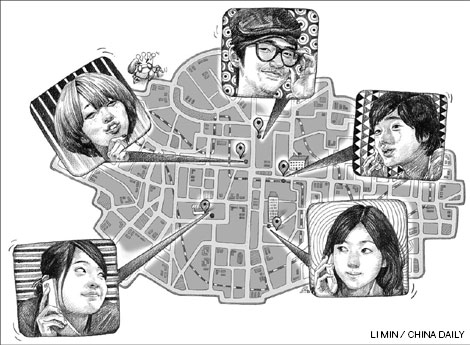Life and Leisure
Just checking in
By Gan Tian (China Daily)
Updated: 2010-10-27 08:13
 |
Large Medium Small |

Location-based social networking is fast catching on, helping busy Chinese stay connected, while also earning them freebies from businesses. Gan Tian reports
Location-based social networking services have emerged as the latest fad among tech-savvy Chinese. The service, which pinpoints the location of smartphones, allows users to "check in" at restaurants, gyms and stores, to share their whereabouts with friends.
Beijing freelancer Luo Xuehan uploads her location via her iPhone on Jiepang.com (the mainland's biggest such service) everywhere she goes, whether jogging in Chaoyang Park, or writing a food review at Starbucks in Sanlitun.
It was only recently at a party that she discovered just how popular the service was.
"I found all the guests were checking in at Jiepang even before they looked at the menu. It seemed everyone had a burning desire to share where they were," Luo says.
For white-collar worker Li Zixi, it is an online service offering offline convenience. On a recent Friday, when Li was caught in a traffic jam in Beijing, a friend saw his location at Sifang.com - that ranks second only to Jiepang - and invited him to his nearby apartment.
"That is why we like this service so much. It brings friends closer, especially in this fast-paced society where nobody seems to have time for others," Li says.
It was Facebook Places that introduced these location-based services, before it was taken by the US-based Foursquare to a higher level. Since both sites are blocked on the Chinese mainland, the Beijing-based Jiepang.com stepped in to take the first bite of the cake.
With apps for iPhone and Android-based phones, Jiepang is China's answer to Foursquare, its founder David Liu says.
Liu is a Chinese-American who grew up in California. He used to run a social networking site to organize offline events while in college. His search for business opportunities brought him to Beijing at the end of last year.
Calling location-based networking services an "unavoidable trend", Liu launched Jiepang.com, together with its applications in May, but it was not until July that the country's youth became familiar with it.
Like Foursquare, Jiepang allows users to upload their whereabouts at any time. If that happens to be a business venue, like a store, a caf, a gym, or a restaurant, they earn points at Jiepang, which then entitles them to free gifts or discounts from these businesses.
When Apple opened its second retail store in Pudong, Shanghai, hardcore fan Zhen Ziheng used the Jiepang application on his iPhone to upload his location there - and won himself a free Apple T-shirt.
In Beijing, freelancer Luo found, after she uploaded her location at the Sculpting in Time Caf several times, that she could use her Jiepang scores to get a cup of coffee for free.
In September, when Nike held a basketball match at Beijing's Dongdan court, some 500 people uploaded their location there, and won themselves free T-shirts.
Jiepang already has some 60,000 users and the numbers continue to grow. At least one check-in happens every four seconds, according to the company.
At present, there are 10 to 20 such location-based networking sites in China, most of which have started co-operating with businesses.
PR giant Weber Shandwick (China) even has a dedicated Digital Communications Department, to connect up their clients with such services.
They also provide businesses with important client information. For example, Sifang.com, that has more than 40,000 users, was able to show Traveler's House Pub in Beijing that Thursday nights saw the fewest check-ins and that there weren't many women among its customers.
Armed with this profile, pub owner Zhang Hengzhi launched a "buy-one-get-one-free" campaign every Thursday evening. He also started offering more snacks and soft drinks, to cater to women's tastes.
"The service helps me know who our loyal customers are. Are they boys or girls and how old are they," Zhang says.
But there are also challenges.
Compared with Westerners, Chinese users are more conservative, which means they do not share their locations as often, according to Jiepang's Liu. "There are cultural differences, to cater to which we have developed features, like a 'private check-in' so that no one else can see it," he says.
Besides, many users lose interest after using the service for a while and this is largely owing to the lack of more functionalities on such sites.
Apple fan Zhen Ziheng says he will never check in at a supermarket via this service, as it is "meaningless". But admits he would consider it if it allowed users to upload a "to-buy" list when the users check in at supermarkets, or a "recommended dishes" column when they check in at a restaurant. Doing so acts not only as a reminder to the uploader, but also signals to others if a particular item is on offer or what meals offer the best value for money.
What such services mean for businesses is that while they help maintain old customers, they have to come up with winning offers to lure new ones.